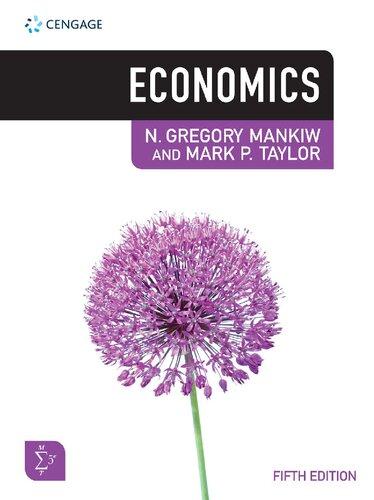You do not have to look too far to find plenty of debate about the state of
Question:
You do not have to look too far to find plenty of debate about the state of economics. There are books written which are heavily critical of mainstream economics, including ‘a chilling tale’ by John Quiggin called Zombie Economics:
How Dead Ideas Still Walk Among Us, Ken Blawatt’s Marconomics, and Rod Hill and Tony Myatt’s The Economics Anti-Textbook to name but three.
Online there are also plenty of articles and blogs which extend the debate. One such example is Cahal Moran’s ‘Why the Problem Is Economics Not Economists’, which appeared on the Open Democracy New Thinking for the British Economy website. Moran does note that many economists are very frustrated with what seems to be a conventional wisdom that all of economics is rooted in neo-classical methodology, and that they are wedded to free markets oblivious to any limitations or weaknesses in the models they use. Economists who do economics know better, and Moran cites two of his colleagues at the University of Manchester, Rachel Griffiths and Diane Coyle (who is now at the University of Oxford), as two examples of such researchers.
For other economists, the issue about whether economics is a science is ‘sterile and crushingly boring’, as noted by Kartik B. Athreya in his book Big Ideas in Macroeconomics: A Nontechnical View. Those like Athreya who spend their days doing economics, know of the limitations of the subject and are well versed in scientific method and process.
This does not, however, seem to stem the flow of criticism of the subject. Hill and Myatt, for example, note ‘The typical introductory economics textbook teaches that economics is a value-free science that economists have an agreed upon methodology; and they know which models are best to apply to any given problem …This Anti-Textbook points out that all this is a myth’ (p1). Blawatt’s opening section is titled ‘The Flagging World of Mainstream Classical Economics’, titled ‘Economics of Power: Failure of Classical Economics’. The sleeve jacket of Quiggin’s book notes: ‘Zombie economics takes the reader through the origins, consequences and implosion of a system of ideas whose time has come and gone.’ If you choose to read anything in economics, including criticisms of the subject, it is important to do so with a critical eye.
In the examples given above, for example, how many of the statements made are positive and how many normative?
Critical Thinking Questions
1 Why do you think that economics has commanded such a barrage of criticism, particularly since 2008?
2 Write a defence of economic models as a methodology for finding out new information about economics.
3 Now write a criticism of economic models as a methodology for finding out new information about economics.
Which of your arguments do you find most convincing and why?
4 Choose one of the references cited. If you could ask the author or authors of the book or article two questions about their book or article and the argument they are promoting, what would they be and why?
5 Look at the quotes provided in the last paragraph of the article. Try to identify which of the statements made are positive statements and which are normative and give a reason for your judgement in each case.
Step by Step Answer:






